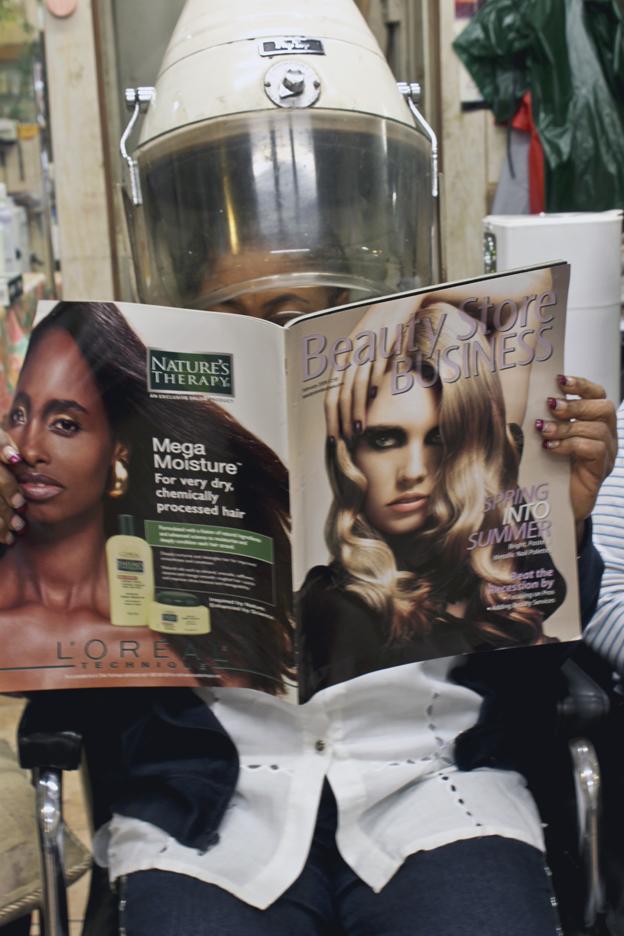“Good Hair:” Not All About Weaves, Perms and Extensions
Why Straightening Out the Kinks in Black Hair Isn’t Necessary, After All
June 27, 2011
Published: November 5, 2009
“[M]y nappy hair isn’t worth anything?” asks a downtrodden Chris Rock in his recent film, “Good Hair.” In the film, Rock explores the hair culture within the black community by exposing the multi-million dollar industry of black hair products and the difficulties that black men and women face in accepting their natural hair textures. As a young black woman who has had her own struggle embracing the beauty of her natural features, I was ecstatic when I first saw the trailer for the film. I could not wait to see this movie because I had never seen such a delicate issue in the African-American community so plainly put to light for discussion on a national level.

The term “good hair” wasn’t coined by Rock as an intriguing movie title. Rather, it is a term that has floated among blacks for generations. When many people say “good hair,” they mean long hair that has a straight, smooth and silky texture, like that of a European’s. Blacks, women in particular, often go to extreme, sometimes dangerous lengths to obtain this coveted hairstyle because African-American hair in its purest form is generally not as glorified by the mainstream as other hair types. There is an unspoken fear among many black women that, if they wear their hair naturally, they will become less beautiful and have difficulty finding a decent job and even a mate.
Black starlets and authoritative figures often reinforce these trends, as it is rare for African-American celebrities to wear their hair naturally. Many times women submit to beauty standards because popular icons make them the norm. As a result, when ordinary black women see their role models such as Michelle Obama, Oprah, Tyra Banks, Beyoncé and Rihanna wear relaxed hair styles, these women follow along.
Today, hair stylists have become quite inventive and have moved beyond the obvious choice of wigs to feign the appearance of “good hair.” Some common methods include weaves, extensions and perms, or the “relaxing” of one’s hair. But these styling techniques are far from perfect; weaves and extensions are notorious for causing significant hair loss if improperly cared for. Also, the dangerous chemicals, such as sodium hydroxide, used in perms can yield serious side effects. One of the most famous scenes in “Good Hair” depicts a science experiment testing what happens to soda cans once exposed to perm solution over a short period of time; viewers are horrified by the results as the sodium hydroxide deteriorates the aluminum. Many women are misled to believe that the hair products are safe because the products are so easily accessible and widely used. Yet the truth is that products this dangerous should not be on the market.
In addition to the physical harm that achieving these hairstyles can cause, these practices are extremely expensive. African-American women across the nation willingly pay millions of dollars a year on hair products, often money we can’t afford to spend. As we put our health and financial stability in danger to achieve this unrealistic beauty standard, one could rightfully question whether the steps women are taking to keep up their appearance are ethical.
It is essential to understand that this battle over acceptable hairstyles isn’t a trivial, superficial debate in the black community without significant historical context. According to Ayana D. Byrd and Lori L. Tharps, the authors of “Hair Story,” we have been conditioned to believe that our natural hair is undesirable since the time of slavery. Due to slave masters’ sexual abuse of female slaves and the resulting mixed-race children, slaves with straighter, silkier hair had a closer, often familial connection to their white plantation masters. This bond was important because it increased the chances of the black slave working in the plantation home, where they had access to education, food, clothing, warmth and possibly even freedom upon the death of the master. In other words, features that resembled those of the Caucasians, such as straight hair on a black person, translated to a better quality of life. Naturally, this logic persisted throughout the years after slavery was abolished, setting today’s black hair trends.
The term “good hair,” solely meaning long, straight hair, is blatantly incorrect. Anyone, regardless of their hair texture, can have beautiful hair. The term “good hair” is outdated and almost irrelevant in today’s world. The media is slowly but surely portraying a more open, diverse perception of beauty, reaching out to all races and ethnicities in ways it never did in earlier years. The fashion is leading this major change, as numerous minority models such as Naomi Sims, Beverly Johnson, Chanel Iman and Alek Wek have graced catwalks and magazine covers around the world. All that is left to do is to abandon these nonsensical, self-imposed beauty standards and to become more comfortable with who we really are.
Fortunately, today there is a group of African-Americans acknowledging the history of “good hair” and the problems that arise when trying to conform to it. Consequently, some blacks are now wearing their so-called “nappy” hair, strong and defiant, ready to make a statement. Enthusiasts of African-American culture are calling this back-to-basics approach a revolution, as younger blacks defy the disapproval of some in older generations.
That is not to say that all black women must immediately sacrifice their hairstyles to return to their originally curly strands; that is not an end-all way to prove that they are comfortable with their ethnic features and identity. The way in which a woman wears her hair is completely up to her volition. Instead, there is another, more reasonable solution that is simple and can be used in many other circumstances of prejudice: we must all learn to accept our true selves, and to stop oppressing others when they do the same.








